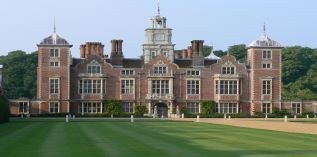Blickling Hall, near Aylsham, Norfolk

Return to home page
Living history at Blickling Hall, Tuesday 19 November
What a wonderful evening when over 50 of us were transported back into history by a young scullery maid occasionally assisted by a smartly dressed Lord Lothian.
The maid, Kath Watts, bumbled in and in her strident Norfolk accent, told us her below stairs story of Blickling in 1937: earning 5 shillings a week (25p in today’s money) and sleeping in an attic room which she shared with Joyce; beginning her day at 6am,finishing at 10pm. Her first task was to make cook Flo Wadlow a cup of tea which she carried up 65 stairs. Kitchen utensils were then carefully placed in order of use, ready for the preparation of a buffet breakfast.
Scullery maids were not allowed to enter the dining room as only the Footmen and Butlers were given the task of putting food on the table. Kath told us of Philip Kerr, 11th Marquess of Lothian, who was a British politician and a diplomat who lived there at this time. He was friends with Lady Astor who was a frequent visitor and the first lady MP in British history. Kath told us with great delight the favorite foods of the Marquess: curry, fish & chips, and white peaches grown at Blickling. It was a revelation to all of us present.
The under-gardener would pick flowers from the garden and apparently had a flair for flower arranging in the house. Scullery maids were not allowed to pick flowers.
Blickling Estate was first mentioned in Domesday. Influential owners included Sir John Fastolf of Caister, 1380-1459. His coat of arms is still displayed. Also Sir Geoffrey Boleyn the grandfather of Ann Boleyn who is said to have been born at Blickling. The present red brick building was built by Sir Henry Hobart after he purchased the property in 1616 for £5,500 - the rebuilding cost £11,000. Blickling is one of the most important Jacobean houses in England.
Our scullery maid then chose from the audience a potential footman and personally checked that he had the strong calves needed to enable him to jump on the back of carriages. They were paid by height. During Victorian times footmen were required to whistle as they carried the food to the dining room - if you whistled you couldn’t eat! For the first two years of WW2 Aircrews from RAF Oulton were billeted here and treated the Hall kindly.
Philip Kerr the 11th Marquess died in 1940 in America. Blickling and its estate passed to the National Trust. During one survey they discovered a ‘Servants punishment room’ on the roof including original graffiti. I wonder if Kath knew of this. Did she spend time there? I hope not.
The real Kath Watts is still with us at 99 years old. What a wonderful lady, and what changes she experienced! Today we can enjoy this magnificent house with all its stories and history from upstairs to downstairs where we can still meet “Kath” and others working in the kitchen. I will definitely be making another visit shortly.
Janet Edwards
[Return to home page]

